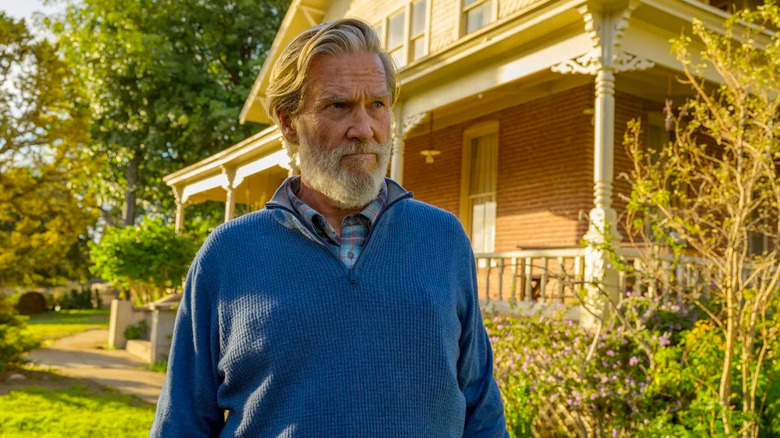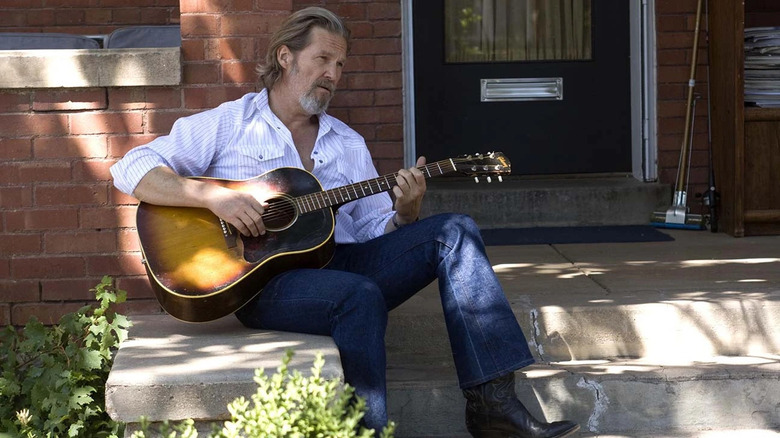Acting Was The Last Career A Young Jeff Bridges Thought He Would Choose
"Crazy Heart." "Thunderbolt and Lightfoot." "The Big Lebowski." "True Grit." "The Old Man" may be the latest chance to see Jeff Bridges' perform, but the American actor has been working for over seven decades. Golden Globes, an Oscar, and a Cecil B. DeMille award later, Bridges reveals to Vanity Fair that he hadn't always planned to follow in the family line of work:
"Well, I initially wasn't attracted to acting, and that's probably because my parents wanted me to be an actor, and what kid wants to do what their parents want 'em to do? I had a lot of other interests. Music and art, painting and so forth. And my father, Lloyd Bridges, he said, "Jeff, don't be ridiculous. That's one of the wonderful things about acting. You get to explore all of those interests that you have, and you're gonna be called upon to do all those things." And I resisted and resisted and maybe I did 10 movies before I finally said, "Oh yeah, this is something I can do. This is, there's a lot of joy in this, and I really enjoy working with all these other artists." So I'm glad I followed the old man's instructions on that."
Not counting Bridges' TV work early in his career, "maybe" ten movies puts the turning point sometime in the mid-'70s, an era when Rolling Stone characterized his vibe as "the All-American look of that fellow in your high school who lettered in three sports, four years running." In the same Vanity Fair look-back, Bridges admits that by the time he did Peter Bogdanovich's "The Last Picture Show" in 1971, he still wasn't sold on acting but felt a thrill from the recognition (his first Oscar nom) he received for his performance as Duane Jackson.
A Man of Many Hats
Jeff Bridges is known for ambidexterity in his role-choosing, oscillating from a disembodied alien in John Carpenter's "Starman," for example, to an accused wife-killer in "Jagged Edge" the following year. It was an intentional strategy that avoided typecasting, and spoke to that early reluctance to act in the first place. At other times in his career, Bridges was as surprised as anyone else to get certain gigs like that of The Dude in "The Big Lebowski," a role brought directly to him by the Coen Brothers themselves. Bridges tells VF:
"Casting is such an interesting, important part of making movies. It's probably 99% of what it takes to make something successful."
His versatility, he observes, made it easier for audiences and casting directors to imagine him playing a spectrum of personalities. Before "Starman," Carpenter had Bridges in mind for the lead role of R.J. MacReady in "The Thing," before Kurt Russell donned the grubby military campaign hat. As hard as it is to imagine anyone but Russell wielding the flamethrower, it would have been a treat to see Bridges go toe-to-toe with a shapeshifting alien.
Of all the careers he considered at a young age, music was one that he was still able to infuse into acting, and he was rewarded with praise for it; his turn as past-his-prime musician Bad Blake in Scott Cooper's 2009 drama "Crazy Heart" enabled him to show off his talents on the guitar, for which he finally earned a Best Actor Academy Award. He's performed on soundtracks, released solo albums, his photography has gotten him an Infinity Award, and he's a published author. The "old man" Lloyd Bridges was right: Jeff got to do it all through acting.

